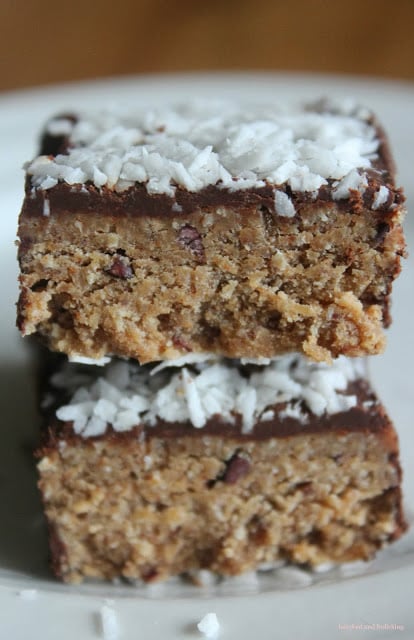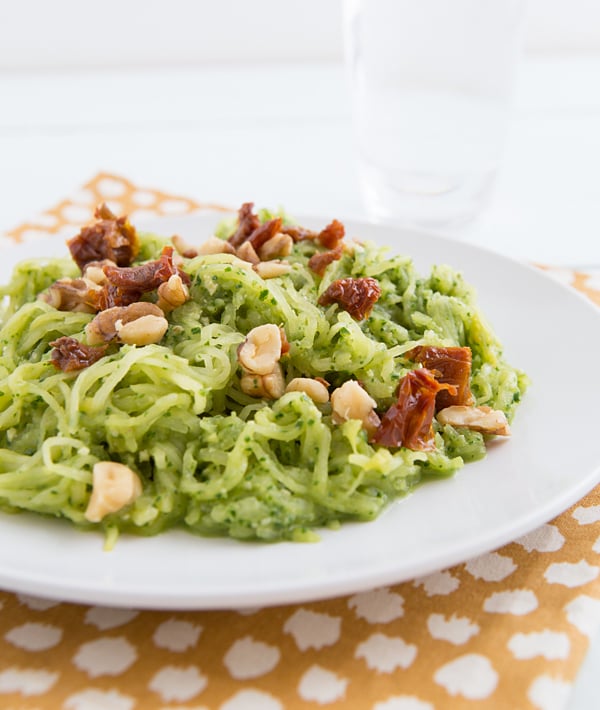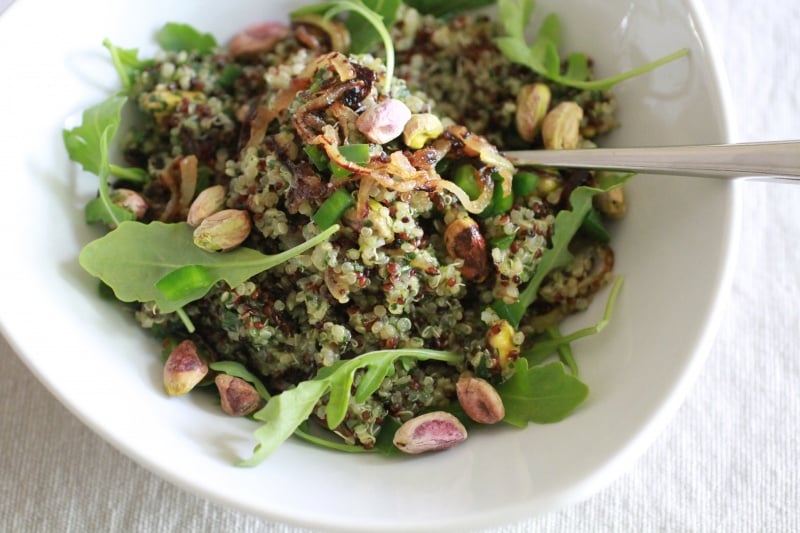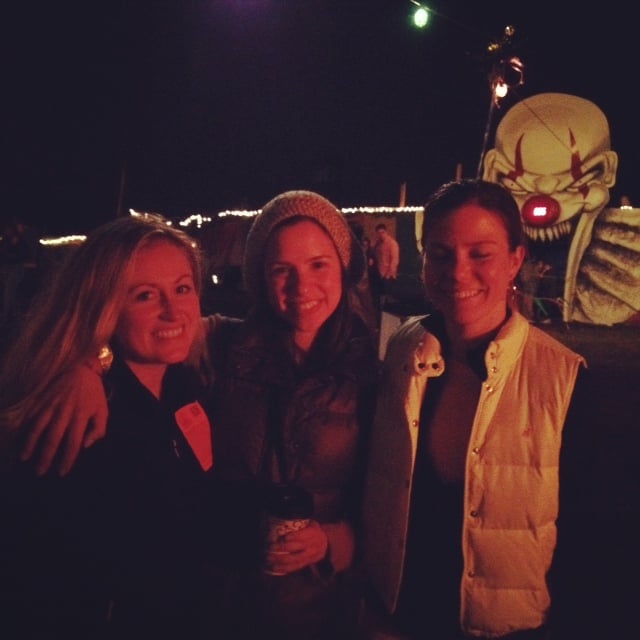Another week has gone by, and it’s time for another edition of weekend reading. Before we get into that, though, thanks for the warm reception to Gutbliss, and also to all of you who shared your personal stories of GI illness and/or healing! All so interesting, and I appreciate your perspectives.
This week flew by, and I can’t believe that November’s already here. I’m not quite ready to start doing cheesy things for the holiday season, but it’ll happen soon. Oh yes it will. But for now, some recipes & reads.
1. Halloween may be over, but Cara’s Trick-or-Treat Halloween surprise cookies remain adorable and enticing.
2. Marlie’s “fulfill your destiny” bars look nutrient-dense and tasty — perfect for a packed afternoon snack!
3. Speaking of tasty, the incomparable Golubka has created yet another feast for the eyes and the senses with her black bean chocolate and fig cookies!
4. Kiersten has come up with a wonderful way to combine autumnal spaghetti squash with all of the pesto you made and froze this past summer.
5. Alicia’s green quinoa looks right up my alley: light, bright, and full of herbs.
Reads
1. A cool, user-friendly video on how meditation impacts the brain.
2. I think I’ve mentioned before that I’m a horror movie fanatic. This article explores why and how some people love getting freaked out. I think I understand my psyche a little better now.
Speaking of freaky, I spent Thursday night at Markoff’s Haunted Forest in Maryland, along with Anne and Heather.
It was super fun! And, just as Anne had promised, it was legitimately freaky.
3. An extremely interesting and complicated article about Lyme Disease in the south. I know that many of my readers have had brushes with Lyme, and I was thinking of them as I read.
4. This article about fraud in the herbal supplement industry. At its center is a study that showed a number of supplements to be advertised misleadingly and stuffed with fillers. While the study referenced was, according to one source, exaggerated, it is not the only one of its kind. I find the lack of regulation in the dietary and natural supplement industry deeply troubling (for a more merciless look at this particular issue, check out Paul Offit’s Do You Believe in Magic?), especially since the industry is growing exponentially. Until better regulation is in place, I think it’s important for consumers to purchase supplements only from trusted brands, and also to speak with knowledgeable herbalists before beginning treatment. A good herbalist will recommend authentic and high-quality tinctures, or even help you to source the herbs you need directly. He or she will also examine how your symptoms work in concert and give you an individualized protocol, rather than simply pointing you toward a capsule that may or may not be what it seems.
5. Vanessa Grigoriadis’ article about juice fasting culture in New York city. This article made me feel, at turns, amused, annoyed, and uncomfortable. Not Grigoriadis’ style or approach so much as the culture she unveils. It’s a culture I saw a lot of, when I first got into raw food: the fixation on purity, the “work hard, play hard, cleanse, repeat” mantra in action. I’m glad that some of the commenters mentioned that “cleansing” can be an expression of disordered eating, because I saw a lot of that in those days (I’m talking about juice only regimens here, not enjoying juice along with nourishing foods).
But of course, the article also made me uncomfortable because I recognized tendencies of my own in it. As Grigoriadis says, “I admit that I have been a part of this tribe, partaken of this beverage.” Maybe not the tribe so much, but the beverage? The desire to make myself purer, neater, better, and the hope that the road to cleanliness is paved with bottles of green lemonade? Sure. I’ve known those thoughts. I’ve known them well. I’m glad that juice has found its proper place in my life–as a nutrient dense elixir, a delightful boost. Yet I remember when I didn’t treat juice this way–when I used it in the hope that it could keep my appetite at bay, defy my body.
“I can’t say who is right,” Grigoriadis writes. “But in our achievement-focused culture, I know how satisfying and pleasurable it is to feel like one is getting rid of gook, even the invisible kind. ‘One of the claims of juicing is that it’s good for your immune system, but in a million years I can’t believe that juicing for three days does anything for your immune system,’ says Barbara Kass, a psychotherapist in Brooklyn. ‘We want to control as much of our lives as we possibly can, to ward off the awareness that you can’t control everything. Letting go of things you can’t control is a key to mental health. And that’s what people can’t do.’”
Before I go, I wanted to share that this past weekend was Farm Sanctuary’s annual walk for farm animals here in D.C. I’ve missed this event two years in a row because of some chemistry exam or another, so I was really happy I could donate and join this year. It happens to have been a gorgeous, cool-but-not-cold fall day in the nation’s capitol:
We gathered our signs and began walking along the mall, handing out leaflets to anyone who seemed open. A couple of people flashed us big smiles along the way. I was all smiles just to be a part of it.
With Thanksgiving on the way, I chose a turkey sign, with the words “compassion begins on your plate.”
The walk date had been pushed back, due to the government shutdown, so it was a very small crowd. At first I felt a little sad that we didn’t have more numbers. But as we made our way around, I realized that in this case numbers weren’t important. If only one person we encountered on the walk asked us about why we were there, or took a leaflet, or simply locked eyes with a poster and started to have a shift in consciousness about the way animals are treated, that was all that mattered. And I also thought back to a familiar quote: “Never doubt that a small group of thoughtful, committed citizens can change the world. Indeed, it’s the only thing that ever has.”
Check out Farm Sanctuary‘s site for more ways you can get involved for animals, big or small. There’s lots of good opportunity around the holiday season. And have a lovely Sunday 🙂
xo
You might also like
It seems to be a pattern lately that I’m not getting weekend reading up until Monday, which to some extent defeats the purpose. But is there ever a bad time for delicious recipes, mouth-watering photos, and thought-provoking reads? Nope. I hope you’ll all enjoy this week’s picks. Rather than ending with dessert, which is what I usually do, I think I’ll start with it. My friend Jackie shared a recipe from the lovely Emily’s new book, Rawsome Vegan Baking, and it looks cray…
This past week, I came across Luke O’Neil’s reflections on his struggle with exercise bulimia in Esquire. The article made me grateful that more is being written about (a) exercise bulimia (I linked to a CNN article in which my friend Abby shared her story a couple weeks ago) and (b) the need for a more gender-neutral discourse about eating disorders in our society. O’Neil sums it up well: “[A]s much as our generations-long assumptions about how men are supposed to behave and feel…
As usual, I’m a little late getting this round up of recipes together, but hopefully there’s still time for my readers to make a few of these recipes for holiday gatherings, or perhaps a New Year’s dinner party! Here are some of my favorite holiday dishes, all of them vegan, some of them raw, most of them gluten free. There’s something for everyone in the 30 appetizers, soups, salads, sides, entrees, and desserts that follow. Though I’ll be blogging through the week (with…
This is the final installment of weekend reading for 2013. This little series is one of my favorite blog developments of the year! It has certainly made me a better and more avid reader of news, and it has also helped me to reconnect with food blog reading and recipe gazing (which I missed). I look forward to more of these posts in the new year. This harissa stew with purple sweet potatoes from Vegan Miam looks incredible. I made a lot of…













Leave a Comment
I am loving these posts! Thanks for sharing some recipes and readings that I otherwise wouldn’t have found.
–jill
Hi Gena,
Great reading tips – thanks. Horror is the one genre I can’t abide, and I wonder if it doesn’t have to do with not feeling particularly safe. Anyway, very fun read. I was also curious to read the article on the herbal supplement industry, though I disagree with you absolutely that it should be regulated. I found it very curious that the article didn’t cite any of the culprits – it it had, I might have taken it more seriously. But as it stands, it’s just scare-mongering. While I have no doubt there are shady companies out there peddling snake oil, I don’t think you have the long lists of injuries due to supplements as you have from prescription drugs (which are, ironically enough, regulated). I know in three decades of taking supplements of all sorts (not that I take as many as some), I haven’t done as much harm to myself as I did in only three years on SSRIs. To say nothing of Nutrasweet, an FDA approved sweetener, which I consumed daily for the better part of a decade, during which time I went from 20/20 vision to needing glasses to find my way to the bathroom. In an ideal world, there would be an agency testing all these herbal supplements and letting us know which companies were trustworthy, but seeing as we don’t live in an ideal world, we have to do our due dilligence, much as we do with products (like food!) that are ALREADY regulated. The presence of the FDA doesn’t stop us from having to read labels so we can avoid TEA with GMOS (Celestial Seasonings, for example) among other truly harmful substances. Give me inactive St. John’s Wort over Prozac any day. Especially since much of Prozac’s effect is a placebo effect anyway.
Hi Elizabeth,
I’m not saying that FDA regulation automatically guarantees a substance’s safety–sadly, I know that it often doesn’t. But even if the methods are flawed, I don’t know that FDA failures mean that supplements shouldn’t be regulated as well as foods or prescription drugs. After all, herbal medicine can be effective precisely because herbs really do have active, and sometimes powerful, effects. The same goes for dietary supplements like (certain) vitamins and probiotics. To my mind, it’s not unreasonable to ensure their quality, purity, and potential risks just as we do for other kinds of prescription treatments. Of course, I recognize a lot of potential messiness here: do we regulate all dietary and herbal supplements? If not, which ones? What standards do we use? But I still think that some oversight, at least in certain cases, is called for. Herbal weight loss supplements, for example, have had documented adverse reactions, and several reports have shown unlisted contaminants in a number of other packaged supplements, including echinacea and St. John’s Wort. Many herbal supplement formulas also make misleading health claims–I’m recalling one gingko supplement that was sold as Alzheimer’s treatment.
So anyway, my point isn’t that substances that are regulated are harmless because they’ve been assessed–if that were true, side effects wouldn’t be so encyclopedic, as you note! It’s more a question of whether I think dietary and herbal substances should in some cases be evaluated for quality, safety, and the kind of claims they make. The system will necessarily be problematic, as it is now with food products, but it might still be beneficial to consumers. The buyer must always beware, but in some cases fraudulent claims or products could be avoided.
Funny about horror movies 🙂
G
PS, as I write I realize that an herbalist friend once told me that the herbs sold in commercial capsules are often too weak to exert the kinds of medicinal effects that using fresh herbal infusions do. But that’s not to say that they are always weak.
Thanks for sharing your thoughts on the juicing article especially Gena. I’ve wanted to do a juice cleanse before but for all the wrong reasons. Barbara Kass’ line on control really hits the nail on the head for me.
Love your foodie picks as always too. The green quinoa looks simply scrumptious.
Hit the nail on the head for me too, Emma! Thanks for your feedback.
I am loving these posts! So much to read and comment on here, but too much work to do just now. But I love your thoughts on the juicing article. And, I am pasting your thoughts on supplements and herbs into my brain. Great way to think about it all. Thanks Gena!
Lovely post as always Gena – Thanks to you I have so much bookmarked on my pocket app to read during tomorrow’s lunch break!
I couldn’t help but sneak a peak at the article on juicing culture in NYC. So much of what she says resonates with me. I remember first discovering juicing at the height of my fixation with raw foods and thinking that a fast/cleanse/detox was exactly what my body needed. If I could only get rid of that “imaginary gunk” as the author puts it, I would feel that much healthier and better. To me there’s also something slightly competitive about the hardcore raw food culture in that everyone is always trying to one-up themselves and I think juicing (especially for long periods of time) is like the holy grail in that sense. In any case – I now view fresh juice more as a treat (especially the fruitier kind) and a nutrient boost as you said. It’s always good to get some perspective – thanks for sharing G!
Those recipes all look amazing! I’m going to have to check out that article on juicing culture too.
The pesto spaghetti squash looks delicious!
Thank you for the recipe mention Gena – I appreciate your kind words, and hope you enjoy the bars. Fulfill your destiny, darling xo